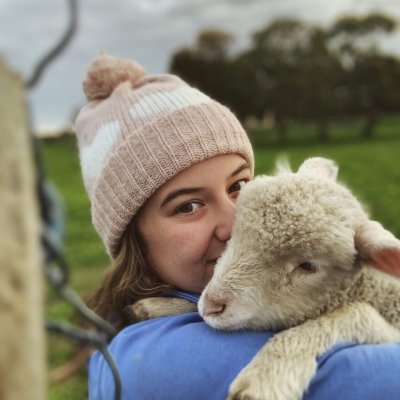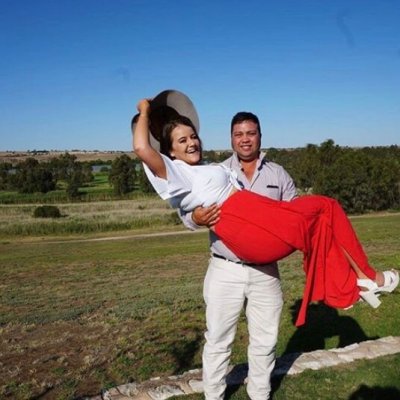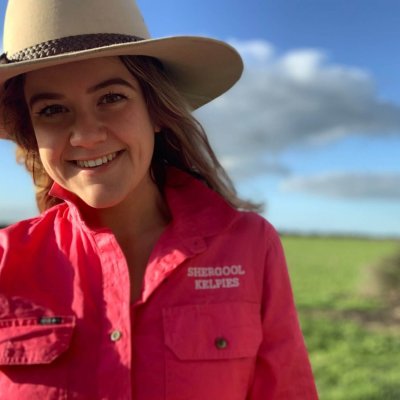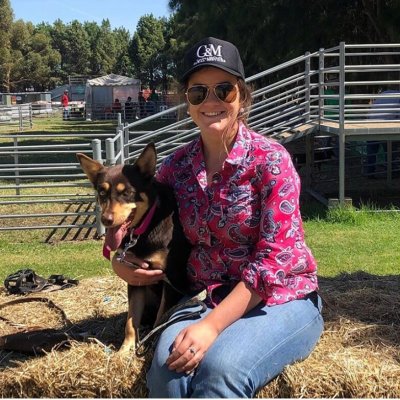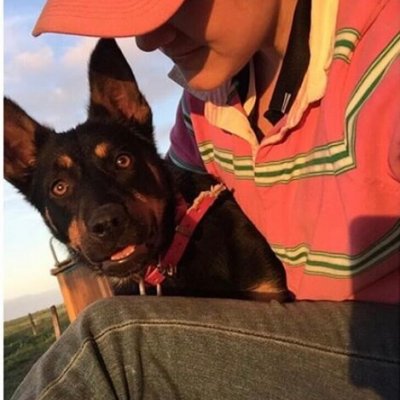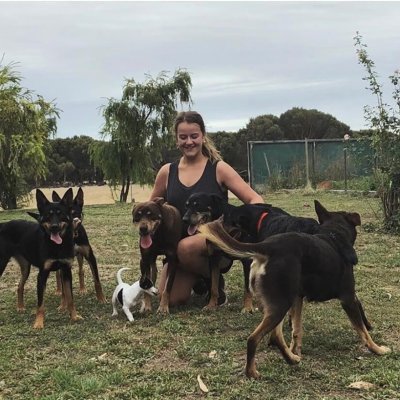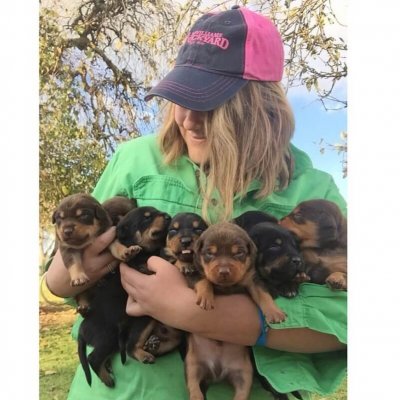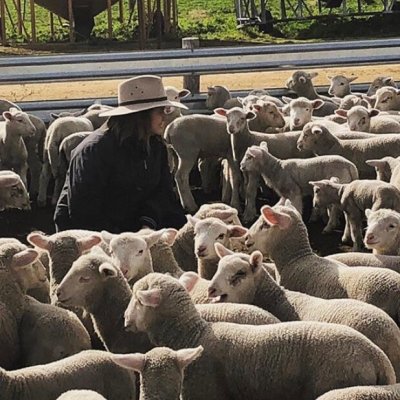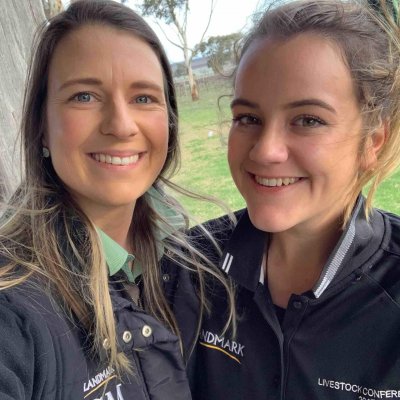Born in Crystal Brook in the mid-north of South Australia, Lucy went on to grow up in the south-east of SA, where her parents worked as publicans upon purchasing a local hotel. She now lives with her fiancé Jon on a property in Avenue Range in SA’s Limestone Coast region. Persistent, kind and determined, Lucy is a proud survivor of Hodgkin’s lymphoma and is currently studying Agribusiness, majoring in Rural Science and with a focus on plant production. Lucy and Jon enjoy working side by side breeding and training kelpies for Shergool Working Kelpies and Lucy is happiest when spending time outdoors with Jon, their eight dogs, multiple ducks and cat, Frank.
When asked what concerned her about the health and safety of those in rural industries and communities, Lucy described a range of dangers on farms, such as working with large, powerful animals and the risk of exposure upon mixing different chemicals. As well as ensuring the right personal protective equipment is worn, she focuses on taking time to plan things so they’re done safely. She also believes it’s important to considering the timing of having conversations about health and safety, making sure everyone is fed and happy beforehand. She values the strong community of support that rural women provide and encourages women to not be afraid of making changes.
How would you describe yourself in three words?
Persistent, kind and determined.
Tell me something interesting about yourself...
I was born in Crystal Brook, South Australia. My parents were publicans and we moved to the south-east of SA when we purchased a hotel there.
I’m currently studying Agribusiness and majoring in Rural Science, with my main focus being on plant production.
My fiancé Jon and I also breed and train kelpies. I live on a farm in Avenue Range with him and our many dogs, ducks, usually a few poddy calves/lambs depending on the time of year and our cat, Frank.
What's one achievement you are most proud of?
Surviving cancer. I was diagnosed with Hodgkin’s lymphoma when I was 16 and had to move to Adelaide for treatment for about a year. My mum supported me through it all and I am so grateful to have her in my life. I am out of remission now however still go to Adelaide for yearly check-ups. I am extremely passionate about health services in rural areas because of this.
What makes you truly happy?
Being outside in the sunshine with my fiancé and eight dogs.
What do you love the most about being a rural woman?
I love how strong we are, and the community that rural women build with each other no matter where we are or how far apart we are. Being on the farm can be lonely, so being able to have those friendships with other rural women is priceless.
Tell me about a time when you felt worried about your own or someone else’s health, safety or wellbeing on the farm, boat or in some other aspect of rural life.
More recently and probably the scariest was when my fiancé rolled the hay truck, was in a lot of pain and unable to climb back into the truck to call for help on the radio. Our area is a black spot and you can’t get any phone service whatsoever, even an emergency phone call – 112 or 000 – will not work whatsoever. I was at home when Jon’s boss rushed in to tell me to get in the ute immediately. At the time, I remember driving out to Jon in shock and in a bit of a daze, but when I saw him lying in pain on the back of the ute being tended to by his boss’s wife Clare (who just happens to be an amazing doctor!) – I immediately burst into tears. It was so scary. It became clear just how lucky he was. Accidents do happen on farms and some can be devastating, and this incident highlighted the importance of needing adequate phone coverage, especially given we’re only halfway between two towns and about a 20-minute drive to either of them. I really do believe that it’s just so important to be able to make an emergency phone call in those situations, especially when you are unable to get to the radio. To think we would need satellite phones just out of a town with full 4G reception is quite frankly ridiculous.
Even more recently, we had a bushfire tear through one of our properties. My fiancé had to go and fight the fires and the wind was constantly changing. I got a text message telling me to take cover (somehow managed to have 1 bar of reception!) and I managed to get the dogs and evacuate to town. I didn’t know what was happening at home and was watching the CFS app waiting for updates. The fire didn’t end up as far south as our place, so the farm we are on and the house were safe however I got a text from Jon to tell me that our other property had been completely burnt out. I was so worried about Jon and everyone else who was out at the fires. Our friends had lost their house but fortunately no one lost their lives. When I left that morning before the fires got out of control, I told Jon as he was climbing into the ute with the firefighting tank “Remember, don’t risk your life which is irreplaceable, trying to save something that is replaceable”. We can buy these other things again, but not people.
There are many times – a farm can be full of dangers if you’re not careful. Other times that come to mind are when my fiancé cut his hand open with a knife and needed stitches and whenever we’re working in the yards with cattle that are a bit wild. You’re working in close proximity with very large animals that are so powerful, so it always puts me on edge.
What practical things did or could you, your partner and / or others do to prevent someone from getting hurt?
Ensuring everyone is wearing a helmet on the farm is a major thing for us. I make sure my fiancé wears his helmet but also straps it up properly. As well as that, making sure we wear gloves when mixing chemicals.
Taking a few extra minutes to plan things just to make sure it’s done safely can make all the difference.
Communication is so important (yet can be difficult with lack of phone reception) and can make all the difference.
"Taking a few extra minutes to plan things just to make sure it’s done safely can make all the difference."
Lucy McCourt-Pearce, Avenue Range, South Australia AU Tweet this
Is there a time, place or scenario when your partner / workers are more willing to make changes to the way work is done?
After he is fed! It sounds silly but there’s no point trying to communicate with him when he’s hungry. While he’s eating or after he’s had dinner he is much more receptive.
If you could give any advice to another rural woman about work health and safety in rural industries, about influencing change in business - or just in general - what would it be?
Don’t be afraid to make a change. Whether it be big or small, don’t let anyone tell you that you can’t do something.
